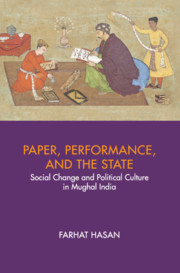Book contents
- Frontmatter
- Dedication
- Contents
- Acknowledgements
- List of Abbreviations
- A Note on Transliteration
- 1 Introduction
- 2 Property and Social Relations: Litigations and Disputes at the Qāzi's Court
- 3 Law as Contested Communication: Literacy, Performativity, and the Legal Order
- 4 Embodiment, Sensoriality, and the Public Sphere: Shifting Popular Perceptions of the State
- 5 State Formation from Below: Authority and Culture in Micro-Spaces
- 6 Towards a Conclusion: The Project of the Nation-State and the Mughal Historian
- Bibliography
- Index
3 - Law as Contested Communication: Literacy, Performativity, and the Legal Order
Published online by Cambridge University Press: 07 August 2021
- Frontmatter
- Dedication
- Contents
- Acknowledgements
- List of Abbreviations
- A Note on Transliteration
- 1 Introduction
- 2 Property and Social Relations: Litigations and Disputes at the Qāzi's Court
- 3 Law as Contested Communication: Literacy, Performativity, and the Legal Order
- 4 Embodiment, Sensoriality, and the Public Sphere: Shifting Popular Perceptions of the State
- 5 State Formation from Below: Authority and Culture in Micro-Spaces
- 6 Towards a Conclusion: The Project of the Nation-State and the Mughal Historian
- Bibliography
- Index
Summary
In line with the arguments delineated in the preceding chapter, the aim here is to explore legal activities in sociocultural spaces, and to look at law within its social settings. I argue that law was a form of contested communication, and we should read legal activity against the backdrop of emergent spaces of inter-subjective communication where social actors engaged with each other's norms and values, experiences and aspirations. It is for this reason that I am inclined to see the legal order as constituting a public sphere, and a space where laws were redefined, traditions were ‘invented’, and notions of justice were elaborated by the elites and socially inferior groups. In order to perceive these developments, we need to remind ourselves that the legal order was crucially shaped by initiatives from below, and we get an inadequate picture if we keep the spotlight on the imperial court, legal–sacral texts, and the literate practices of the state. In trying to make sense of social communication in legal spaces, it is important to bear in mind that even as the Mughal empire was an enormous paper regime, and their rule saw a rapid expansion in ‘pragmatic literacy’, literacy inter-penetrated with oral traditions in shaping the legal order in localities. One effort here is to look for their traces in the extant documents and see the extent to which orality and performativity accompanied and encircled the state's literate juridical practices.
While I eschew state determinism, I still believe that the communications between the state, the local power-holders, and juridical bodies were crucial to the reproduction of the legal order. These communications, I argue, served to push the state, through initiatives from below, into a position of juridical primacy, for the state was not just seen as the mediator between competing norms and laws, but also considered as the protector of the shared normative system. In the towns and villages, the state agents in localities – the qāzi's court (‘adālat), the kotwāl's platform (chabutra), the mutasaddi's establishment (darbār), and so on – provided the space for the institution, reproduction, and contestation of shared norms and values. To study the legal order, we cannot afford to ignore the state, but the state should itself be seen as a social formation, constituted and reproduced in the legal spaces by incessant, if contested, communications with the social forces.
- Type
- Chapter
- Information
- Paper, Performance, and the StateSocial Change and Political Culture in Mughal India, pp. 39 - 66Publisher: Cambridge University PressPrint publication year: 2021



